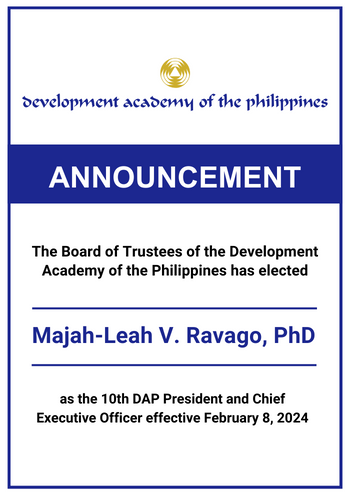The Asian Productivity Organization, a regional intergovernmental organization that seeks to contribute to the socioeconomic development of Asia and the Pacific through the enhancement of productivity, will hold its 61st Governing Body Meeting in Manila this coming April 10-12. Expected to be attended by some 70 foreign and local delegates, the meeting will be hosted by the Development Academy of the Philippines, the mandated national productivity organization (NPO) of the country that acts as the focal institution carrying out the country’s commitments to the APO and implements all APO-related activities in the Philippines.
The last time the country hosted the GBM was in 1998. It is part of the country’s commitment as a charter member of the APO where it is expected to host ministerial meetings of the 20-country organization in a rotating cycle of hosting among the member countries.
The Governing Body is actually the supreme organ of the APO. It is composed of the directors designated by each member government who meet annually, usually in April, to discuss and decide on policy, finance, programs, membership and other governance issues concerning the organization.
The APO was originally composed of eight countries when it was organized on May 11, 1961, with the Philippines among the founding members along with the Republic of China (now Taiwan), India, Japan, Republic of Korea, Nepal, Pakistan and Thailand. It has evolved to its current network of 20 member countries that now also include Bangladesh, Cambodia, Fiji, Hong Kong, Indonesia, Islamic Republic of Iran, Lao PDR, Malaysia, Mongolia, Singapore, Sri Lanka, and Vietnam.
APO membership is open to countries in Asia and the Pacific that are members of the United Nations Economic and Social Commission for Asia and the Pacific (UN ESCAP). Since the APO’s inception, it has contributed significantly, in collaboration with NPOs, to the promotion and improvement of productivity in member countries while performing its roles as think tank, catalyst, regional adviser, institutional builder, and clearing house of productivity information. The APO has helped member countries through a range of activities that include technical assistance, capability building and information dissemination, among other things, in the areas of productivity and quality improvement in the agriculture, industry, public and service sectors.




